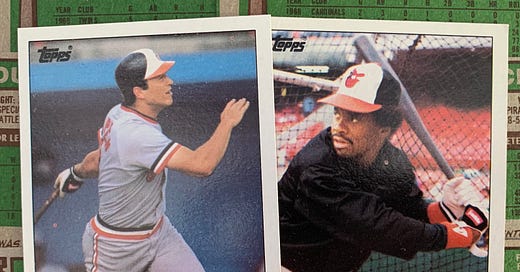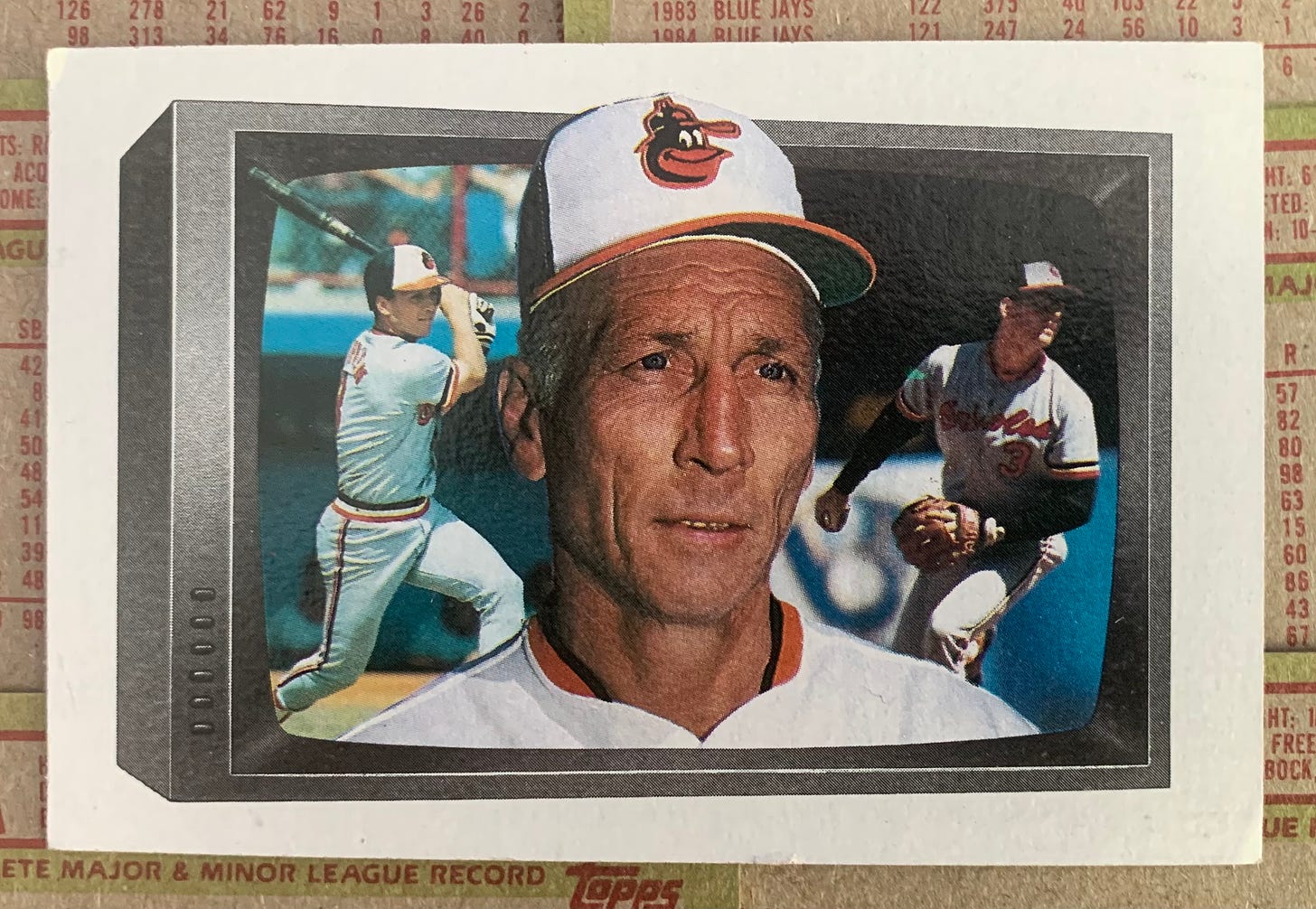Welcome to Warning Track Power, a weekly newsletter of baseball stories and analysis grounded in front office and scouting experiences and the personalities encountered along the way.
Mike Sacks first appeared to me as a byline. Two years ago, The New Yorker published a rare interview with John Swartzwelder, the famously reclusive comedy writer who made great contributions during his time with The Simpsons.
Sacks, who wrote And Here’s The Kicker: Conversations with 21 Top Humor Writers on Their Craft in 2009 and Poking A Dead Frog: Conversations with Today’s Top Comedy Writers in 2014, secured the interview with Swartzwelder because the veteran comedy writer had held the publication in high regard since his younger days.
The interview, which ran in Q&A form, included wisdom from Swartzwelder that changed the way I approached this column instantly:
How much time and attention did you spend on these scripts? Another “Simpsons” writer once compared your scripts to finely tuned machines—if the wrong person mucked with them, the whole thing could blow up.
All of my time and all of my attention. It’s the only way I know how to write, darn it. But I do have a trick that makes things easier for me. Since writing is very hard and rewriting is comparatively easy and rather fun, I always write my scripts all the way through as fast as I can, the first day, if possible, putting in crap jokes and pattern dialogue—“Homer, I don’t want you to do that.” “Then I won’t do it.” Then the next day, when I get up, the script’s been written. It’s lousy, but it’s a script. The hard part is done. It’s like a crappy little elf has snuck into my office and badly done all my work for me, and then left with a tip of his crappy hat. All I have to do from that point on is fix it. So I’ve taken a very hard job, writing, and turned it into an easy one, rewriting, overnight. I advise all writers to do their scripts and other writing this way. And be sure to send me a small royalty every time you do it.
Sacks and Swartzwelder liberated my writing process. I returned to the interview, which I recommend you read in its entirety, several times in the weeks and months after first reading it. (You can click here to access it.)
My next impression of Sacks came when he popped up on my Twitter feed — the algorithm went above and beyond on this day — pictured wearing an Orioles t-shirt.
To be old enough to appreciate the Orioles’ World Series season of 1983 yet too young to know how fleeting a champion’s grasp could be was also to be young enough to be attracted to The Simpsons from its earliest Bart-driven days and right on time to treasure the comedic nuance once it became Homer’s show.
Kids from Pittsburgh, Detroit, and Kansas City may have grown up similarly.
But for those coming of age within a reasonable radius of Memorial Stadium, such a trajectory also included Ocean City, Maryland, for Senior Week, the annual post-graduation migration to the beach (downey aychun) for several days of amateur debauchery, wannabe or otherwise.
At the age of 18 — outside of family, friends, formal education and Led Zeppelin — the Orioles, The Simpsons, and Ocean City were the three independent entities that influenced and inspired me most.
Lest I slip back into meditation, let me quickly state that these factors made me very excited to speak with Mike Sacks, lover of the O’s, comedy, and all things Maryland.
Instead of turning to mathematical models, I figured we could glean wisdom on the 2023 season from someone who has interviewed Buck Henry, Harold Ramis, Mel Brooks, Mike Schur, Amy Poehler and many more. Someone whose favorite Orioles include Cal Ripken, Eddie Murray, and Al Bumbry.
“I think they’ll make the playoffs,” Sacks, who grew up in Maryland just outside of Washington, D.C., and watches the team these days from his Brooklyn apartment, says of the O’s. “And I think they’ll maybe win one round. At the very least, I think it’s gonna be a fun season.”
It’s impossible to talk about the current Baltimore team without mentioning Adley Rutschman. Sacks shares the same feelings about the catcher that many fans do.
“He genuinely loves the game. And what is interesting, too, is I’ll watch these games with my daughter, who’s turning 14, and my wife, both of whom are not baseball fans, but both of whom love Adley Rutschman. He sort of pops, you know. He’s bigger than baseball,” he says.
Sacks is on the editorial staff of Vanity Fair. In addition to The New Yorker, he has written for GQ, Esquire, Time, McSweeney’s, among others. For those WTP readers who also enjoy 10,000 Maniacs, you may be interested in Sacks’ recent interview of Natalie Merchant. (Look, four home openers, including the one at Camden Yards, have already been postponed. I want to make sure you have plenty of keep yourselves occupied with today.)
There was no way, though, that we’d steer clear of nostalgia during this conversation.
“For me, listening to Jon Miller, that’s the voice of my childhood… I mean, that was like walking down the Ocean City Boardwalk, or even walking through Little Italy in Baltimore or Greektown, where we used to go often, and hearing the game coming out of the houses and apartments. I just love that sound. That, to me, is the sound of summer.”
Sacks played baseball growing up, but he finds himself most attracted to the personalities around the sport. His works of fiction suggest as much. I have been reading Randy, a hilarious fictional biography of a delusional man from Maryland who lives in a bizarre universe of Sacks’ creation. (It’s certainly not mainstream humor, but if you consider yourself a bit twisted and enjoy 7-Eleven and Natty Boy references, this book is for you.) The care with which Sacks examines every breath of Randy’s existence seems like it would carry over to how he observes the game.
“What interests me to write about are the people who follow the teams who, you know, would dress in caps, t-shirts, and wear orange Orioles shirts. That to me is more interesting than writing about baseball, although with that said, a huge influence on me growing up was Tom Boswell. I read everything he wrote. He was one of the best baseball writers around and the irony was he lived in a city where there was no baseball. He was a huge influence on my writing, where he would find stories about these players that were more interesting than the stats.”
One story that Sacks brings up is that of Cal Ripken Sr.
“All he wanted to do was manage a Major League team,” Sacks says. “And then he got the opportunity.”
In 1987, Ripken skippered the Orioles to a 67-95 record. In the infamous ’88 season, he was dismissed only six winless games into the campaign.
“How one deals with that fascinates me. It’s not really winning so much — it’s how do you deal with losing?”
Baseball is a game of failure and adjustments, but Sacks is asking about something else. A player working his way out of a slump is different from a baseball lifer — and an outstanding coach and instructor — losing a grip on his only chance to manage a big league team. The tenure of Ripken Sr. as manager also included a drunk-driving arrest in February 1988, a harbinger of the ignominious season to come.
As Sacks is suggesting, the case of Cal Ripken Sr. is a study of humanity, resiliency, and reality. Baseball fans often demand perfection out of inherently flawed people.
I mentioned to Sacks how important his interview of Swartzwelder was to me.
“I thought that was the some of the best advice I’ve ever heard: You create an imperfect world and then improve it,” he replied.
It feels like what happens on the baseball field every night.
In Baltimore, they certainly created an imperfect world. Sacks believes this is the year they improve it.
WTP offers free and paid versions. Sign up now and never miss a word.






I'm pleased to note that the author graduated from amateur debauchery to professional debauchery... in a tasteful way.
I appreciated the Swartzwelder quote immensely.
The title jarred me because I started following Mike Sacks on Instagram only about a week ago. I don’t think I knew who he was off the cuff, but Amy Sedaris had reposted something of his that was terribly wonderful. Since then have been delighting in his posts, and now this! I love the connections your column creates.